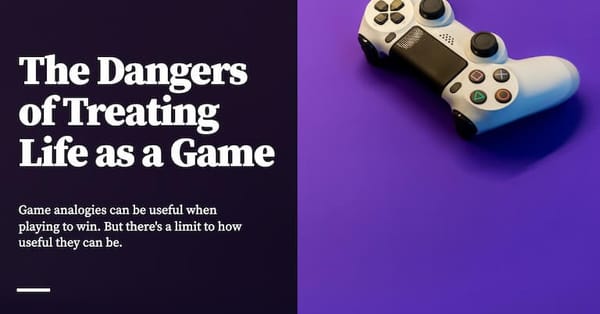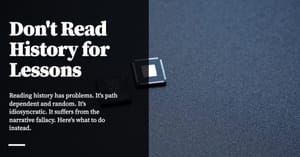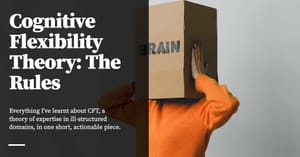Late last year I wrote an essay titled Are You Playing to Play, or Playing to Win? which seems to have haunted a great many people. I got a fair amount of reader feedback in the weeks after the piece, and I thought one argument in particular was worth examining in further detail.
First, a quick recap — in my original essay, I introduced the concept of a ‘scrub’, citing Street Fighter tournament player and game designer David Sirlin:
"Scrub" is not a term I made up. It sounds like kind of a harsh term, but it's the one that was already in common usage in games to describe a certain type of player, and it made more sense to me to explain that rather than to coin a new term.
A scrub is not just a bad player. Everyone needs time to learn a game and get to a point where they know what they're doing. The scrub mentality is to be so shackled by self-imposed handicaps as to never have any hope of being truly good at a game. You can practice forever, but if you can't get over these common hangups, in a sense you've lost before you even started. You've lost before you even picked which game to play. You aren't playing to win.
A scrub would disagree with this though. They'd say they are trying very hard. The problem is they are only trying hard within a construct of fictitious rules that prevent them from ever truly competing.
I argued that it was totally possible to take on scrub-like behaviours in business and in life, and that we should be careful when we do so. The way I articulated it was through the words of my friend Lesley, who said: “you want to make sure you’re playing the actual game, not some more complicated game you’ve made up in your head”. And there is some merit to this view: you are not, for instance, more virtuous or heroic or better qualified if you succeed in business by playing a more difficult game; nobody is really keeping score that way.
The twist, of course, is that we do admire people who play more difficult games — assuming that they continue to win. We admire Roger Federer, for instance, who has dominated the top levels of international tennis playing a beautiful — if more difficult! — style of tennis, the same way that Judo players admire Shohei Ono, who has remained undefeated in the -73kg weight category for a few years now, despite consistently going for dominate throw, choke, or armbar. (Ono tries as much as possible to win on large points, instead of penalties; this places him at a disadvantage relative to the rest of his competition).
So what’s the problem with this view? The problem, of course, is that it uncritically treats life as a game.
What Game Are You Playing?
It is sometimes very useful to think of life as a game. For instance, I’ve written at length on using the ‘metagame’ to identify the very edges of some skill domain, in order to build a learning syllabus for yourself. And I’ve also found it useful to think through the analogy of an ‘early/mid/late’ game, to remind myself that careers tend to play out over 40 year arcs. But there are limits to the idea, and I think it’s worth calling out those limits.
I’ve mentioned some of these limits in passing in my previous pieces. For instance, in my essay on the metagame, I wrote:
Like simpler games, real-world metas come in roughly two flavours: ones that are defined by external changes to the rules of a game, and ones that are shaped by a dynamic equilibrium of competition within a stable system of play. Unlike games, however, real-world domains have no set rules: they are vastly more complicated and interesting, because the rules change only when someone notices the rules have changed.
And in Are You Playing to Play, or Playing to Win? I wrote:
In other words, if I’d played the ‘customer-service’ game, it is likely that I would’ve failed, and sold to someone like Malone. But perhaps there was a way around it? The difficulty of business — and the difficulty of thinking about scrub behaviour in business — is that the rules are often only what you can discover to be true. (And even those rules may change, depending on the behaviours of competition). There is no explicit game designer to balance play in the markets; you are truly on your own.
I think it’s fairly obvious that real world games have no clear rulesets, beyond that which you discover to be true for yourself. But the most important limitation of treating life as a game is that all game analogies assume clear win conditions that are shared by all the players. Life has no such thing.
Let’s make this more concrete.
In my Playing to Win essay I argued that scrub behaviour in business occurs when you attempt to build a successful company with more constraints than is absolutely necessary to succeed. (I wrote this mostly as a reminder to myself; heaven knows I’ve had hangups around ‘proper’ operations in the past). One variant of this seems to be related to growing large businesses using limited external capital — we do seem to admire businesspeople who are able to bootstrap their companies using limited equity or debt. For a taste of this, it’s helpful to read the very first chapter of Kochland, which is essentially the hagiographic retelling of a 1985 meeting in Wichita, Kansas, where a 45-year old Charles Koch, the CEO of Koch Industries, flipped the finger at a contingent of Morgan Stanley bankers; the bankers were incredulous that he refused to take the company public.
But look at what we’ve just done: the frame we’ve used assumes that the game of business is to ‘maximise enterprise value; get rich in the process’. This seems, on the surface of it, a reasonable proposition — isn’t the point of business to generate a return for shareholders? Certainly Koch was leaving money on the table by not going public; arguably he was also limiting his own ambitions by not tapping into the superior liquidity of the public markets. But if we zoom in a little, the story gets rather complicated rather quickly.
One could say that Charles Koch was playing a different game. As far as I can tell, the Koch brothers treated business as a canvas on which they could express their deeply held free-market beliefs. (Whether those beliefs resulted in unalloyed evil I’ll leave for others to decide — my point is simply that they had certain goals, and they achieved those goals rather systematically through a privately-held conglomerate over the course of their lives). It’s probably unfair to describe Charles Koch’s refusal to take his company public as a scrub move — he had, after all, sufficient free cash flow from both the Pine Bend refinery and his commodities trading subsidiary in the summer of 1985. Koch didn’t lack for capital; he was simply playing a different game.
This is a roundabout way to say that what a scrub is really depends on what game you decide you’re playing. If Tesla CEO Elon Musk’s game is ‘get humanity to electric vehicles’, then if, say, Tesla goes bankrupt but every other car manufacturer gets into EVs, Musk can retire and say that he had a great run and he won his game. A typical public equity investor, though, would say that Musk was a scrub because he didn’t create lasting shareholder value. And they’d both be right, for the game that they’ve chosen to play.
Don’t Lie About The Game You’re Playing
So what can we conclude from this? It seems like we’ve now backed away from the simple idea that we may categorise someone as a scrub based on their actions alone. In truth, we may only say that someone is a scrub if we know what game they’re playing.
This makes scrub evaluation radically more difficult. I think the only thing I can say with confidence is that you shouldn’t act like a scrub with reference to the game that you’ve chosen to play, but more importantly, you shouldn’t lie to yourself about what game you’re actually playing.
This is almost certainly an internal evaluation.
After all, Elon Musk can blow Tesla up and then retire, saying that he had meant for Tesla to push humanity to electric vehicles all long. But then a hedge fund manager would probably say that Musk was lying; that he was the CEO of a publicly traded company, and that CEOs of publicly traded companies have a fiduciary duty to their shareholders and therefore ‘don’t make your company blow up’ should’ve been built into the win conditions of his game. But really the only person who truly knows the game he’s playing is Musk himself; we can only speculate from the outside.
The prescription that we last settled on — that you should be sure that ‘you’re playing the real game, not some more complicated game that you’ve made up in your head’ — is now a more complex ‘make sure you know what game you’re playing, and don’t lie to yourself about the conditions necessary for your definition of success’.
We’ve gone from a simple prescription to a more complicated one. But sometimes that’s just how reality works — and the simplicity of a game analogy isn’t useful when it diverges from life.
Endnote
The bulk of these ideas are from conversations with a small handful of readers and friends (hi, Shawn!) but I’d like to highlight one specific contributor. Kris Abdelmessih has thought a lot about the overlap between life and games, and he helpfully pointed me to his notes on philosopher C. Thi Nguyen’s views on the philosophy of games and society. I owe him for some of the ideas in this piece; Abdelmessih was a trader for much of his career, and he likes to quote from this 2011 James Somers article:
(...) If that sounds a bit silly, consider for a moment what makes a game a game.
The trick seems to be that games are constrained in a way that the real world isn't: there is a board, field, pitch, court, area, table, ring or other enclosure that bounds the action in space; clocks that bound it in time; and rules that restrict the space of allowable moves.
In some ways those constraints are what make games mentally satisfying, because they relieve us of what existentialists called "the anxiety of freedom." By giving us obvious, well-defined goals, they save us from having to define success; and with points, leaderboards, heads-up displays, indicators, badges, etc., they tell us exactly when we've achieved it.
Humans crave that kind of structure, probably because we get so little of it in real life. It's a lot harder to say whether you "have a healthy romantic relationship" or "are making a lasting contribution to something bigger than yourself" than that you've "lined up the yellow gemstones," "scored more points than the other team in twenty minutes," or "collected forty pounds of silver."
Think of the pleasure we get crossing things off lists, the thrill of reaching "inbox zero" or finishing a book. We want to accomplish things and, maybe more importantly, we want to know that we've accomplished them.
Games (and video games in particular) exploit that essential insecurity. They're engineered to unfold as a series of short feedback cycles, every action a small experiment that concludes in minutes, if not seconds, with concrete consequences: you either win or lose points. That vivid loop keeps you constantly engaged. It sucks you into the micro-mechanics of the game, because even the smallest maneuvers give you the feeling of "getting somewhere." You can't help but tweak, tweak, tweak your way up the game's learning curve, an eye always on your rising score.
Now think of what a trader does. A trader's job is to be smarter than the market. He converts a mess of analysis and intuition into simple bets. He makes moves. If his predictions are better than everyone else's, he wins money; if not, he loses it. At every moment he has a crystalline picture of his bottom line, the "P and L" (profit and loss) that determines how much of a bonus he'll get and, more importantly, where he stands among his peers. As my friend put it, traders are "very, very, very competitive." At the end of the day they ask each other "how did you do today?" Trading is one of the few jobs with an actual leaderboard, which, if you've ever been on one, or strived to get there, you'll recognize as being perhaps the single most powerful driver of a gamer's engagement.
It’s worth reflecting on the idea that while many of us may treat game analogies as simple lenses for the world, there are whole vocations for which life can be best seen as a game. Trading, for better or worse, is one of them.
Originally published , last updated .
This article is part of the Market topic cluster, which belongs to the Business Expertise Triad. Read more from this topic here→





